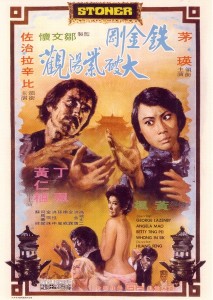Stoner
铁金刚大破紫阳观
Hong Kong, 1974, colour, 2.35:1, 110 mins.
Director: Huang Feng 黄枫.
Rating: 4/10.
A minor entry in the oeuvre of director Huang Feng and action star Mao Ying [Angela Mao].
Hong Kong, the present day. After a drugs auction in Hong Kong, a Taibei police inspector (Huang Feng) is alerted and sends policewoman Li Shuhua (Mao Ying) over to investigate as an undercover agent. It turns out that a druglord, Jin Pu (Takagi Joji), is pushing a new aphrodisiac pill. In Sydney, Australia, ruthless detective Joshua Stoner (George Lazenby) is searching for his girlfriend Melanie (Romanolee Rose) and finds her dead in an empty room where a sex cult has been operating. After later finding a Daoist charm on a dead anti-drugs agent, Joshua Stoner goes to Hong Kong, where he’s followed by Jin Pu’s girlfriend, Wang Yanyan (Ding Pei), and later beaten up by Jin Pu’s men. Meanwhile, Li Shuhua has found out the drug is being distributed via a temple and manages to infiltrate Jin Pu’s organisation. Li Shuhua and Joshua Stoner meet at the temple but both are caught when he accidentally sets off an alarm. Jin Pu has him fed the drug and locked in a cage with Li Shuhua.
REVIEW
Some two years in the coming [to UK cinemas] and finally arriving in an abysmally-dubbed and sloppily-processed print with 10 minutes missing, Stoner 铁金刚大破紫阳观, the first of several films which George Lazenby has made for Golden Harvest in Hong Kong recently [the others being The Man from Hong Kong 直捣黄龙, 1975, and A Queen’s Ransom 鳄潭群英会, 1976], is only of marginal interest to those interested in the career of director Huang Feng 黄枫, inferior even to Deadly China Doll [UK release title of The Opium Trail 黑路, 1973], itself a disappointment after Hap Ki Do 合气道 (1972) and When Tae Kwon Do Strikes 跆拳震九州 (1973). Lazenby is presumably the selling-name, for it remains a mystery why such a minor entry in Huang’s oeuvre as Stoner should be released here while a work like the gloriously accomplished The Tournament 中跆拳坛生死战(1974) – starring Mao Ying 茅瑛 [Angela Mao], Huang Jiada 黄家达 [Carter Huang] and [Korean hapkido master] Hwang In-shik 황인식 | 黄仁植, but no Lazenby – moulders on the shelves. In the title role of Stoner, Lazenby is distinctly robotic, and the whole has not a jot of the flair brought by director Brian Trenchard-Smith to GH’s later The Man from Hong Kong. There are good reasons, for Huang’s leisured, accumulative style is hardly suited to such a story of dope-ring smashing, even when peripherally concerned with modern-day Daoism as here. The film’s only claim to interest is as another entry in the Huang/Mao partnership: the same sexual characterisation, with Mao in boyish disguise (pushed to its comic extreme in the sequence in which Lazenby is fed the aphrodisiac drug and locked in a cage with her), the same restraint in unleashing her full powers until the final reel (and what a splendidly acrobatic fight it is – a major entry in her catalogue), plus the same gamine humour. Mao’s contract with Golden Harvest has since expired, but hopefully her announced “retirement” will be brief. [Mao went on to make increasingly poor films during the 1970s and her career petered out during the 1980s. Her final film was in 1992.]
CREDITS
Produced by Golden Harvest (HK).
Script: Ni Kuang, Huang Feng. Photography: Li Youtang. Editing: Zhang Yaozong, Michael Kaye. Music: Tony Orchez, Li Zhaohua. Art direction: Chen Jinshan. Costumes: Zhu Shengxi. Sound: Zhou Shaolong, Wang Ping. Action: Zhu Yuanlong [Hong Jinbao/Sammo Hung], Chen Quan.
Cast: George Lazenby (Joshua Stoner), Mao Ying [Angela Mao] (Li Shuhua), Ding Pei (Wang Yanyan/Agnes), Hwang In-shik (Mr. Big), Takagi Joji (Jin Pu), Hong Jinbao [Sammo Hung] (Chen Jin, gang strongman), Jin Lu (Helen, bar girl), Romanolee Rose (Melanie), Samuel J. Peake (cult leader), Yang Wei (shrine priest), Sun Lan (gangster), Hong Xingzhong (Feng, police inspector), Su Xiang (Guan Deren), Huang Feng (Li Shuhua’s boss), Gim Gi-ju, Sima Hualong.
Release: Hong Kong, 2 Aug 1974.
(Review originally published in UK monthly films and filming, Jan 1977. Modern annotations in square brackets.)
